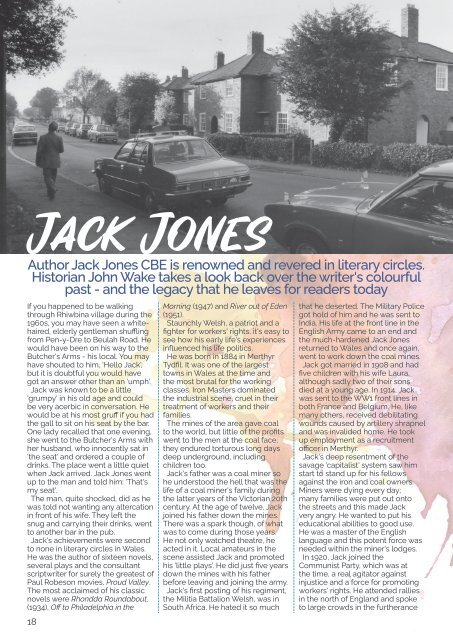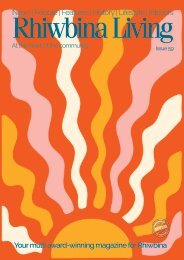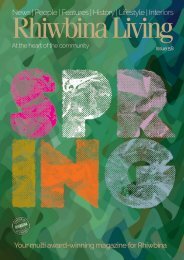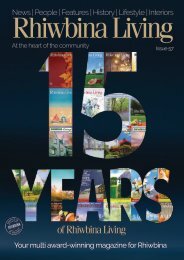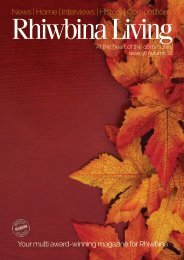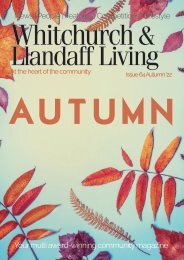Whitchurch and Llandaff Living Issue 62
Spring 2022 issue of the award-winning Whitchurch and Llandaff Living
Spring 2022 issue of the award-winning Whitchurch and Llandaff Living
You also want an ePaper? Increase the reach of your titles
YUMPU automatically turns print PDFs into web optimized ePapers that Google loves.
Jack Jones<br />
Author Jack Jones CBE is renowned <strong>and</strong> revered in literary circles.<br />
Historian John Wake takes a look back over the writer's colourful<br />
past - <strong>and</strong> the legacy that he leaves for readers today<br />
If you happened to be walking<br />
through Rhiwbina village during the<br />
1960s, you may have seen a whitehaired,<br />
elderly gentleman shuffling<br />
from Pen-y-Dre to Beulah Road. He<br />
would have been on his way to the<br />
Butcher's Arms - his local. You may<br />
have shouted to him, 'Hello Jack',<br />
but it is doubtful you would have<br />
got an answer other than an 'umph'.<br />
Jack was known to be a little<br />
'grumpy' in his old age <strong>and</strong> could<br />
be very acerbic in conversation. He<br />
would be at his most gruff if you had<br />
the gall to sit on his seat by the bar.<br />
One lady recalled that one evening,<br />
she went to the Butcher's Arms with<br />
her husb<strong>and</strong>, who innocently sat in<br />
'the seat' <strong>and</strong> ordered a couple of<br />
drinks. The place went a little quiet<br />
when Jack arrived. Jack Jones went<br />
up to the man <strong>and</strong> told him: 'That's<br />
my seat'.<br />
The man, quite shocked, did as he<br />
was told not wanting any altercation<br />
in front of his wife. They left the<br />
snug <strong>and</strong> carrying their drinks, went<br />
to another bar in the pub.<br />
Jack's achievements were second<br />
to none in literary circles in Wales.<br />
He was the author of sixteen novels,<br />
several plays <strong>and</strong> the consultant<br />
scriptwriter for surely the greatest of<br />
Paul Robeson movies, Proud Valley.<br />
The most acclaimed of his classic<br />
novels were Rhondda Roundabout,<br />
(1934), Off to Philadelphia in the<br />
18<br />
Morning (1947) <strong>and</strong> River out of Eden<br />
(1951).<br />
Staunchly Welsh, a patriot <strong>and</strong> a<br />
fighter for workers' rights, it's easy to<br />
see how his early life's experiences<br />
influenced his life politics.<br />
He was born in 1884 in Merthyr<br />
Tydfil. It was one of the largest<br />
towns in Wales at the time <strong>and</strong><br />
the most brutal for the working<br />
classes. Iron Masters dominated<br />
the industrial scene, cruel in their<br />
treatment of workers <strong>and</strong> their<br />
families.<br />
The mines of the area gave coal<br />
to the world, but little of the profits<br />
went to the men at the coal face;<br />
they endured torturous long days<br />
deep underground, including<br />
children too.<br />
Jack's father was a coal miner so<br />
he understood the hell that was the<br />
life of a coal miner's family during<br />
the latter years of the Victorian 20th<br />
century. At the age of twelve, Jack<br />
joined his father down the mines.<br />
There was a spark though, of what<br />
was to come during those years.<br />
He not only watched theatre, he<br />
acted in it. Local amateurs in the<br />
scene assisted Jack <strong>and</strong> promoted<br />
his 'little plays'. He did just five years<br />
down the mines with his father<br />
before leaving <strong>and</strong> joining the army.<br />
Jack's first posting of his regiment,<br />
the Militia Battalion Welsh, was in<br />
South Africa. He hated it so much<br />
that he deserted. The Military Police<br />
got hold of him <strong>and</strong> he was sent to<br />
India. His life at the front line in the<br />
English Army came to an end <strong>and</strong><br />
the much-hardened Jack Jones<br />
returned to Wales <strong>and</strong> once again,<br />
went to work down the coal mines.<br />
Jack got married in 1908 <strong>and</strong> had<br />
five children with his wife Laura,<br />
although sadly two of their sons<br />
died at a young age. In 1914, Jack<br />
was sent to the WW1 front lines in<br />
both France <strong>and</strong> Belgium. He, like<br />
many others, received debilitating<br />
wounds caused by artillery shrapnel<br />
<strong>and</strong> was invalided home. He took<br />
up employment as a recruitment<br />
officer in Merthyr.<br />
Jack's deep resentment of the<br />
savage 'capitalist' system saw him<br />
start to st<strong>and</strong> up for his fellows<br />
against the iron <strong>and</strong> coal owners.<br />
Miners were dying every day;<br />
many families were put out onto<br />
the streets <strong>and</strong> this made Jack<br />
very angry. He wanted to put his<br />
educational abilities to good use.<br />
He was a master of the English<br />
language <strong>and</strong> this potent force was<br />
needed within the miner's lodges.<br />
In 1920, Jack joined the<br />
Communist Party, which was at<br />
the time, a real agitator against<br />
injustice <strong>and</strong> a force for promoting<br />
workers' rights. He attended rallies<br />
in the north of Engl<strong>and</strong> <strong>and</strong> spoke<br />
to large crowds in the furtherance


